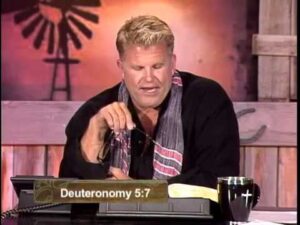
Family and Marriage
Shawn McCraney's "Heart of the Matter" explores Mormonism and Biblical Christianity, offers a PDF book, Bible study, and seeks unique guests for a 2011 series.

Shawn McCraney's "Heart of the Matter" explores Mormonism and Biblical Christianity, offers a PDF book, Bible study, and seeks unique guests for a 2011 series.

Shawn McCraney critiques Mormonism, emphasizing God's grace and the need for discernment against false teachings. He highlights Mormonism's ties to occult practices and Masonic rituals, urging alignment with biblical doctrine.

Faith is like water, essential and varied. Good Faith trusts God's Word, leading to salvation, unlike LDS views linking faith to obedience. True faith results in righteousness.

Shawn McCraney critiques Mormonism, emphasizes grace and personal relationship with Jesus, trusts the Bible over modern revelations, and contrasts Christian and Mormon views on prophecy.

Shawn McCraney contrasts Mormonism's early indoctrination with biblical Christianity's faith approach, emphasizing marriage as a sacred, lifelong union, only breakable by sexual immorality.

Shawn McCraney contrasts Mormon and biblical views on King David's fate, emphasizing forgiveness through Jesus, critiquing Mormon unforgivable sin doctrine, and promoting personal faith in Christ.

Shawn McCraney contrasts Christian and Mormon views on the cross, emphasizing its centrality in Christianity and critiquing LDS for downplaying its significance.

Shawn McCraney argues the true church is a collective of believers, not tied to institutions. He critiques Mormonism's authority focus, promoting personal faith over hierarchy.

Shawn McCraney's teaching critiques Mormonism by presenting factual history, emphasizing biblical consistency, and challenging speculative interpretations, especially regarding Cain and racial ideologies.

Spiritual rebirth involves justification and sanctification through faith in Christ, contrasting with Mormonism's works-based righteousness. Emphasizes grace, Holy Spirit's role, and critiques LDS conditional salvation.

Shawn McCraney teaches spiritual rebirth as a singular, transformative event through faith in Jesus, contrasting with LDS views of rebirth tied to ordinances.

Shawn McCraney critiques LDS interpretations of biblical texts, emphasizing biblical inerrancy in original manuscripts, and advocates for faith in Jesus over doctrinal specifics.

Shawn McCraney emphasizes the Bible's unique reliability and centrality for faith, contrasting it with other religious texts. He critiques Joseph Smith's undermining of the Bible's credibility, highlighting the Bible's historical consistency and divine authority. The teaching underscores the Bible's comprehensive role in Christian life, its historical transmission, and the exclusion of inconsistent texts like the Gnostic Gospel of Thomas. Despite translation critiques, the Bible remains a unified, transformative document, available in numerous languages, guiding believers in understanding Jesus and salvation.

Shawn McCraney discusses Mormon "Baptism for the Dead," introduced by Joseph Smith for posthumous salvation, using 1 Corinthians 15:29, vital for LDS theology.

Water baptism is symbolic, not essential for salvation. It signifies faith and spiritual rebirth, differing from Mormon views. Salvation is through faith in Jesus, not rituals.

Shawn McCraney's "Heart of the Matter" explores Mormonism vs. Biblical Christianity, emphasizing love, respect, and faith-based salvation, contrasting LDS works-based views.

Shawn McCraney critiques Mormon apostleship, emphasizing biblical foundations in Ephesians 2:11-20. He argues LDS apostles lack firsthand witness of Jesus, unlike original apostles.

Shawn McCraney refutes LDS claims of total apostasy and restoration, arguing biblical teachings show only partial apostasies. He critiques LDS scriptural interpretations and asserts the Church's endurance.

Mormonism views angels as humans in progression, differing from the Bible's distinct, superior spiritual beings. Shawn critiques LDS doctrines, highlighting inconsistencies and occult influences.

Shawn McCraney critiques Mormon views on Adam and Eve, contrasting them with biblical teachings. He emphasizes their disobedience led to humanity's fall, challenging LDS doctrines.